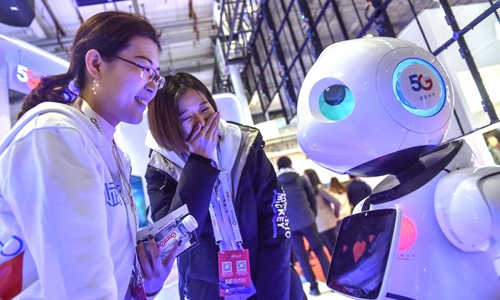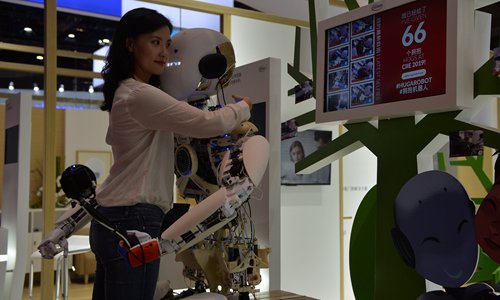HOME >> CHINA
China embraces sci-fi future
By Zhao Yusha and Zhang Hongpei Source:Global Times Published: 2020/1/3 23:23:40
Nation at forefront of tech trends: report

Visitors watch a 5G robot during the 2019 World 5G Convention in Beijing. Photo: Xinhua
Whether it's robots fighting in Real Steel, explorers in Mission to Mars, a robotic hospital bed in Roujin Z or smart cars in Die Another Day, movie plots have often foreseen fanciful and fantastic technology in 2020.
Sci-fi stories have often been in the near future around 2020 and the writers of those stories might be in for a shock this year to see so much of the modern technologies of their imagination become reality, and some of them will likely occur in China this year.
The hottest 10 technology trends of 2020 are outlined in a report published this week by the Alibaba Damo Academy.
They predict Artificial Intelligence (AI) based on cognitive psychology and human history.
Mass cooperation between machines could also be possible as intelligent equipment and systems work together to coordinate city traffic, moving cargo and packing in factories.
Some believe autonomous cars will boom in 2020.
At least seven companies rolled out robotaxi services in the past year and tech giant Baidu has started a trial run.
China will build 5G base stations on a massive scale in 2020 and 5G will be deployed in all urban areas of China, Wang Zhiqin, deputy director of the China Academy of Information and Communications Technology under the Ministry of Industry and Information Technology, said at a conference last month.
With the commercialization of low latency, high speed 5G and popularization of the Internet of Things (IoT), machine-to-machine communication and coordination will further reduce the need for human labor in industrial production and consumption scenarios, said Zuo Shiquan, head of the equipment manufacturing research institute under the China Center for Information Industry Development.
Zuo told the Global Times that it was "inevitable" robots replace repetitive workers, but this would also create more "surprising" careers.
"More personalized services like psychological counseling will become the trend in the future with robots," said Zuo.
2020 also marks a landmark year for space technology.
China, the US and the UAE plan to send probes to Mars. The successful launch and flight of a Long March-5 rocket has lent impetus to China's ambitious space program.
Planned missions include the Chang'e-5 lunar probe and the country's first Mars probe.

A woman hugs Roboy, a humanoid robot developed at the Artificial Intelligence Laboratory of the University of Zurich, at the second China International Import Expo in Shanghai. The robot imitates the musculoskeletal system of the human body and can engage in simple conversations. Photo: VCG
Chinese officials in 2019 disclosed for the first time the construction of a state-backed digital currency project, the Digital Currency Electronic Payment.
The nation's head start in blockchain technology will help it gain an early edge in the field, with speculation about when China's central bank will issue the digital currency.
Insiders told the Global Times that as competition heats up, Beijing does not want to see other digital currencies dominate and weaken the yuan's position.
Rapid technological development has triggered privacy controversies.
The Damo report said the government has begun on policies to protect data security while noting most data-sharing platforms have the same weaknesses like complicated data sharing processes, high communication expenses and high risk of data leaks.
"China's regulations and rule-making in terms of data protection have caught up quickly over recent years to align with the industry's development," said Zuo.
China's regulation of privacy was "basically in line with other countries," Zuo asserted.
Massive strategic potential
China still lags behind the US in chipset manufacturing, but open-source RISC-V processors and system-on-a-chip design platforms for AI and Internet of Things scenarios will promote rapid development of an open-source ecology, the Damo Academy report said.
Modular design will also accelerate the pace of delivery for chipsets, the report said.
"The trend of building up an open-source ecology and new methods of design will help China narrow the gap with the US," an industry insider, who asked to remain anonymous, told the Global Times on Thursday.
In September, Alibaba semiconductor subsidiary Pingtouge unveiled the Hanguang 800, its first AI-dedicated chip, amid a government-accelerated self-sufficiency push brought on by the Huawei saga of last year.
China is also ramping up efforts to compete with the US in quantum computing, a fundamental technology with the most strategic significance in the 21st century - and one where the US hasn't established an advantage, industry analysts said.
More investment, intensifying competition and a richer industrial ecology will drive quantum computing in 2020, said the report.
"China needs collective efforts from the government and industry players to focus on the quantum computing sector, or the gap with the US could widen this year," said Guo Guoping, a key research fellow in the development and research team and professor at the Hefei-based University of Science and Technology of China.
Fault-tolerant quantum computing and a demonstration of quantum advantages can be expected this year.
Guo told the Global Times that the sector in its early phase deserves massive investment as it has massive strategic potential.
Posted in: SOCIETY